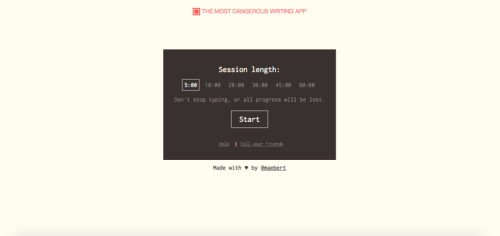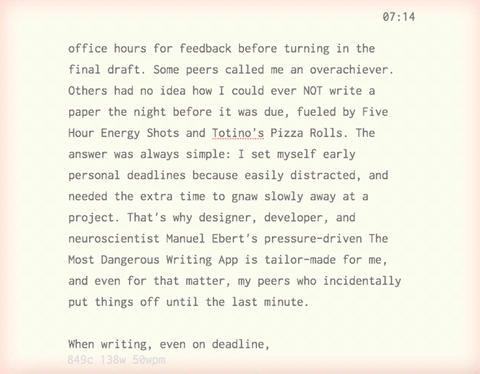The Digital Archiving team is currently working on the creation of an app that aims to explore what rethinking the “archive” would mean for pedagogy and writing. One implication of rethinking “archiving” and “writing” might be that writing in digital media is always already a process of archiving. How might our daily academic writing change? What technologies aimed at “everyday writing” already exist?

There are already many apps intended to draw attention to the meta-writing process. For example, software programs and applications such as Draftback archive the revision process while the author writes. Thus the writer can easily locate the draft at which she made a specific edit. There are also apps which, paradoxically, harness Writer’s Anxiety in order to encourage those of us crippled by perfectionism to finish a first draft. Examples include Write or Die, Flowstate, and similar apps that erase the writer’s words if he, she, or they fail to accomplish a set writing goal


source: killscreen.com
As for procrastinators find themselves easily distracted online, there are browser extensions such as Citrus, StayFocused, and Cold Turkey which block specific websites during set hours. Of course, seeking out anti-procrastination aids can be a form of procrastination itself. Fortunately, online communities such as Actually ADHD compile resources for time management, organization, and dictation software that may be of use to writers with or without ADHD.
This short introduction to the world of writing-aid technology provides only a glimpse of available resources. Furthermore, the world of writing-aid technology is not only centered on resources. An archive of writing technologies would include not only tools but access to (virtual or “irl”) communities and skill sets as well. Which raises this question: can an article or literature review qualify as an archive? What is the difference between archiving an object, a resource, or a skill? I hope to explore the later question in light of the possibilities offered by new media archives.
Until then, I direct you towards the Digital Research Tools (DiRT) Directory; a collection of digital tools that extend beyond writing, archiving, and the scope of this limited post. Happy writing.

